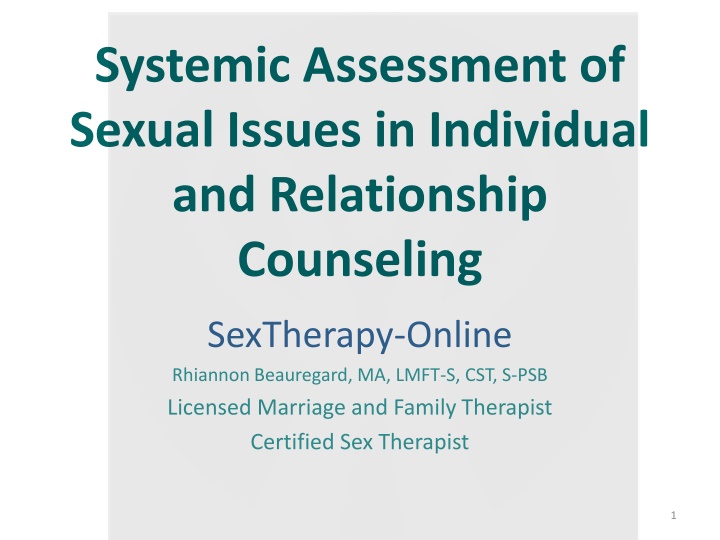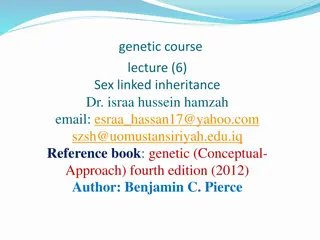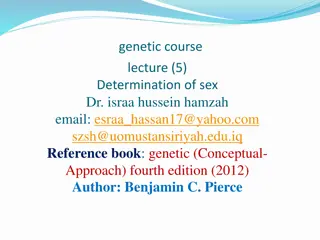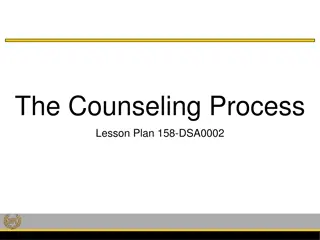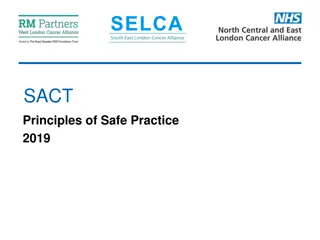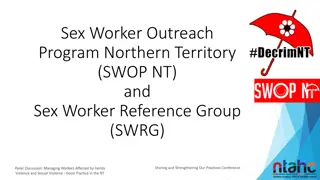Systemic Assessment of Sexual Issues in Counseling and Sex Therapy
Explore the importance of systemic assessment in addressing sexual issues in individual and relationship counseling. Discover how to effectively treat multi-causal sexual issues through comprehensive assessments. Emphasizing the ongoing nature of sexual issue assessment in every session, this presentation by Rhiannon Beauregard provides valuable insights for clinicians. Visit SexTherapy-Online for more resources and stay engaged through live tweeting and sharing information.
Download Presentation

Please find below an Image/Link to download the presentation.
The content on the website is provided AS IS for your information and personal use only. It may not be sold, licensed, or shared on other websites without obtaining consent from the author.If you encounter any issues during the download, it is possible that the publisher has removed the file from their server.
You are allowed to download the files provided on this website for personal or commercial use, subject to the condition that they are used lawfully. All files are the property of their respective owners.
The content on the website is provided AS IS for your information and personal use only. It may not be sold, licensed, or shared on other websites without obtaining consent from the author.
E N D
Presentation Transcript
Systemic Assessment of Sexual Issues in Individual and Relationship Counseling SexTherapy-Online Rhiannon Beauregard, MA, LMFT-S, CST, S-PSB Licensed Marriage and Family Therapist Certified Sex Therapist 1
About the Presenter Rhiannon Beauregard, MA, LMFT-S, CST, S-PSB is a Licensed Marriage and Family Therapist, Certified Sex Therapist, and Specialist in Problematic Sexual Behavior Licensed in five states: Maine, Massachusetts, New Hampshire, New York, and Texas Specializing in Sex Therapy with individuals and relationships and problematic sexual behavior Based in Austin, TX 2
Some Details This presentation and many other resources are available online at my website: www.SexTherapy-Online.com I don t mind if you stay wired with this presentation- feel free to post, tweet, comment, blog, whatever. Live tweeting is a great way to share info and stay engaged: Twitter Handle: SexTherapyOnlne LinkedIn: Rhiannon Beauregard Google+: SexTherapy-Online #NorthCentralUniversity 3
What We Are Going To Cover We are going to talk about the Systemic Assessment of Sexual Issues in Individual and Relationship Counseling. We are not going to talk about specialized treatment, for sexual issues, but will cover how you have the ability within yourselves as clinicians to TREAT sexual issues. 4
What I Want You To Take Home All sexual issues are MULTI-CAUSAL. You are likely VERY qualified to treat most of the issues that can cause a sexual issue. You can figure out what those multiple causes are by doing a comprehensive systemic assessment of the individual/couple/relationship/family/etc. You are not alone and do not have to treat complicated sexual issues all by yourself. 5
What I Want You To Take Home Assessment of sexual issues is ongoing and needs to occur in EVERY SINGLE SESSION YOU HAVE. Sex isn t this one time thing you ask about then never mention again. It is intertwined into everything we do. Always ask about it, otherwise it conveys a message that it isn t an essential part of the clients relationship. 6
What It Means to Be Sex Positive What does it mean to you to be a SEX POSITIVE THERAPIST? 7
What It Means to Be Sex Positive The general belief that if sex is healthy and consensual, then it is positive. Emphasis on safe sex and consent. The sex-positive movement is a social and philosophical movement that advocates these attitudes. The sex-positive movement advocates sex education and safer sex as part of its campaign. It does not make moral distinctions between heterosexual or homosexual sex or the type of sexual activities, regarding these choices as matters of personal preference. (Gabosch, 2014) 8
Systemic Assessment As an MFT, you are likely already doing a comprehensive systemic assessment of your clients. Systemically assessing your clients for sexual issues will ASCENTUATE your current assessment processes. Systemically assessing your clients will give you a LOT of information to develop a plan for treatment. NOT systemically assessing for sexual issues will probably not give you all the information you need to treat effectively. 9
With any assessment it is important to determine: Current Baseline Optimal Sexual Functioning (the ideal sex life at the end of treatment) Sexual Desire Sexual Satisfaction Level of Distress Experienced Because of the Sexual Problem Problem s impact on intimate relationships Most of this information can be found in the two books by Hertlein, Weeks, & Sendak 10
The Therapist Should Be Sure to Ask About Any physical illnesses or chronic medical conditions (including medication) The overall relationship The level of communication The level of affection in their relationship The level of sensuality in their relationship Whether there is anything else that the therapist needs to know Most of this information can be found in the two books by Hertlein, Weeks, & Sendak 11
Feel free to use a pre-established assessment measure to have your clients get the conversation started about sex. https://sextherapy-online.com/online- sex-therapy-forms/ 12
Systemic Assessment of Sexual Issues Individual Assessment Physiological Psychological Interactional Assessment Intergenerational Assessment Sociocontextual and Ethnocultural Factors Gender and Gender Roles Religion/Spirituality Economic and Financial Racial and Ethnic Considerations Sexual Orientation Other Practices and Relationship Identities (Kink, Poly, Swinging) Political Views 13
Individual Assessment Physiological Psychological Psychological assessment of of cognitions, behaviors, and affect Life stressors Thoughts about sexuality and self. Assess body image concerns and physical attractiveness Anxiety and styles of stress management Life stage and developmental changes Presence of other disorders as well Take medical history Analyze/evaluate medications and side effects Physical examination focusing on specific sexual and physiological functioning to ensure that nothing else is wrong Run specific tests to see if there are other things going on in the health of the client 14
Interactional Assessment Couples degree of cohesion, empathy, commitment autonomy Communication Anxiety in Sexual Relationships Patterns in relationship carrying over into sexual relationship High conflict Sexual Satisfaction Sexual functioning- current, previous and optimal Conflict resolution patterns GENOGRAM, but ask about sexual patterns, low desire, sexual problems, miscarriages, infertility etc. Relationship issues/problems Lack of sexual satisfaction Often times sexual dissatisfaction is what brings the clients in in the first place Sexual timetable Difference of desire longstanding turning into arousal concerns Observe overall relational dynamics Length of relationship, offspring, relevant extended family members 15
Intergenerational Assessment Ask about family of origin and how sex was talked about at home Explore if the couple was raised differently in how sex was talked about taught, etc. Explore family of origin Genograms Explore sexual and relationship Genograms- Past events and experiences in related to sex and relationship Are their family patterns of sexual issues? Review Past Storm Damage Activity Write down any past, bad, or negative experiences of sexual activity that they remember including self exploration 16
Sociocontextual & Ethnocultural Assessment of Sexual Issues HOW MIGHT YOU ASSESS FOR THESE FACTORS AND HOW THEY RELATE TO SEXUAL ISSUES? Sociocontextual and Ethnocultural Factors Gender and Gender Roles Body Image Religion/Spirituality Economic and Financial Racial and Ethnic Considerations Sexual Orientation Non-normative Practices (Kink, Poly, Swinging) Political Views 17
Four Assessment Measures I use for All Clients Sexual Genogram Doing a genogram with SPECIFIC questions around sex, sexual functioning, fertility, sexual messages, etc. Sexual Timeline A timeline stemming from the beginning of ones sexual identity to now Causal Factors Mind Map Body Image Drawing A drawing that goes over No, Whoa, And Go Zones 18
Causal Factors Assessment Exercise 20
Causal Factors Assessment Exercise 21
Sexual Timeline Assessment Exercise 23
PLISSIT Model Permission Give clients PERMISSION to speak about their sexual issues Give clients permission to feel comfortable about the sexual topic Therapist is a nonjudgmental, listener Normalize and Validate Limited Interventions Provide limited and specific information on the topic Offer a limited amount of resources, information, organizations, support groups, books, self-help programs, podcasts, videos PLISSIT Model created by Jack Annon (1974) 24
PLISSIT Model Specific Suggestions Intensive Therapy Give client specific suggestions, interventions, assignments to help with the issue Provide intensive therapy for more complex issues Deal with the deeper issues PLISSIT Model created by Jack Annon (1974) 25
A Brief Word About Competency You are not expected to the job of a sex therapist. You can t do it all. You are expected to assess your clients systemically as an MFT and to refer when you are not competent in an area and it is out of your scope. If you want to do sex therapy, become more competent in sex therapy. How? KNOWLEDGE + EXPERIENCE = COMPETENCY which leads to CONFIDENCE in working with sexual issues. 26
Action Items Start Assembling Your Team of Referring Providers. It would be helpful if the following professionals were included in your team : Sex Therapist Someone who specializes in working with problematic sexual behavior Urogynecologist/Gynecologist that specializes in sexual health Urologist that specializes in sexual health Physical therapist that specializes in pelvic health Sexual Product Specialist 27
Where to Find Your Team You ve already found your sex therapist! A good place to start is visiting my website for a comprehensive list of associations and societies dedicated to sexual health: https://sextherapy- online.com/resources/professionals-and- associations/ Ask your clients or your own practitioners who they refer to or use. Just start networking. Chances are they could use a good marriage and family therapist to refer to as well! 28
Contact www.SexTherapy-Online.com Phone: 512.765.4741 Email: Rhiannon@SexTherapy-Online.com Fax: 888.288.8495 Twitter: SexTherapyOnlne Please feel free to contact for questions and materials, mentoring, case consultation, supervision, and referrals! 29
Any Questions? Logo with tagline 3-cropped.jpg 30
References Annon, J. S. (1974). The behavioral treatment of sexual problems, Vol. 1: Brief therapy. Honolulu, HI: Kapiolani Health Services. Association of Reproductive Health Professionals (2010). Sex therapy with non-sex therapists. Clinical Fact Sheet. Available online. Hertlein, K.M., Weeks, G. R., & Gambescia, N. (2009). Systemic sex therapy. New York: Routledge. Hertlein, K.M., Weeks, G. R., & Gambescia, N. (2009). Systemic sex therapy: A clinicians guide. New York: Routledge Howard, H. S. (2012), Sexual Adjustment Counseling for Women with Chronic Pelvic Pain. Journal of Obstetric, Gynecologic, & Neonatal Nursing. doi: 10.1111/j.1552- 6909.2012.01405.x 31
